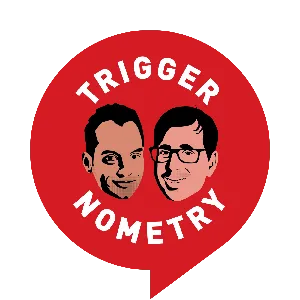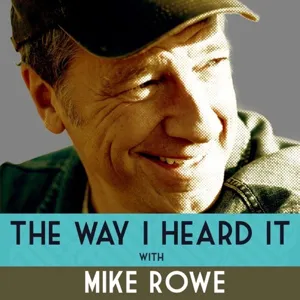Podcast Summary
Open Dialogue and the Harm of Intolerance: The importance of open dialogue and avoiding intolerance and censorship is crucial for intellectual growth and progress, but young adults are being sheltered from challenging ideas and becoming overly sensitive to perceived offenses, leading to a culture of 'call-out' behavior.
Learning from this conversation between Sam Harris and Jonathan Haidt is the importance of open dialogue and the potential harm of intolerance and censorship, particularly on college campuses. The authors of "The Coddling of the American Mind" argue that young adults are being sheltered from challenging ideas and are becoming overly sensitive to perceived offenses. This trend, they caution, can stifle intellectual growth and lead to a culture of "call-out" behavior. Harris and Haidt discuss the role of intentions in morality, the concept of "fragility" in modern society, and the paradox of progress. They also touch on the importance of defining terms clearly and avoiding the use of loaded language. Ultimately, they emphasize the need for open-mindedness and respectful dialogue in order to address complex issues and make progress as a society.
The Culture of Sensitivity and Trigger Warnings in US Higher Education: The culture of sensitivity and trigger warnings in US higher education may discourage free speech, foster unhealthy thought patterns, and negatively impact students' mental health and intellectual growth.
The higher education system in the United States is facing a crisis regarding the promotion of a culture that discourages free speech and fosters an environment of sensitivity and trigger warnings, potentially leading students to develop unhealthy thought patterns and increased anxiety and depression. This issue came to light in 2013-2014 when students began requesting safe spaces and demanding the removal of certain materials from the curriculum due to their perceived danger or trauma. Greg Lukianoff, president of the Foundation for Individual Rights in Education, saw parallels between these student behaviors and the negative thought patterns he had learned to avoid in cognitive behavioral therapy. Together, they wrote an article in 2015, which later became a book, warning about the potential harm of this culture on students' mental health and intellectual growth. Despite some dismissing this issue as overblown, it has continued to escalate, with instances of violence on campuses and increasing calls for censorship.
The importance of viewpoint diversity and challenging perspectives: College campuses face issues with decreased support for free speech, mainly affecting iGen or Gen Z students in liberal arts colleges on the northeast and west coast. Extreme views dominate, making it hard for others to speak up, emphasizing the value of diverse perspectives to refine arguments and gain a nuanced understanding.
The importance of viewpoint diversity and challenging perspectives was highlighted in a discussion about the perceived issue of decreased support for free speech on college campuses. A political scientist's challenge to the argument led to a clarification that the issue isn't with millennials, but rather with iGen or Gen Z students, and that the problem mainly exists in liberal arts colleges in the northeast and west coast. The discussion also emphasized that the change isn't due to a significant shift in the average student, but rather in the dynamics that allow a subset of students with extreme views to dominate, making it difficult for others to speak up. The value of diverse perspectives was underscored as a means to refine arguments and gain a more nuanced understanding of complex issues.
The rise of call-out culture in modern society: Younger generations are deeply rooted in call-out culture, where individuals can be publicly shamed for perceived offensive comments or actions, leading to a divide between those who support free speech and those who embrace this new norm.
The increase in connectivity through social media and other digital platforms has led to a culture of call-out culture, where individuals can be publicly shamed and humiliated for perceived offensive comments or actions. This culture, which began on college campuses, has spread into the corporate world, particularly in creative industries dominated by graduates from elite universities. While older generations may view this as a passing student trend, the new norms have deeply taken root among younger generations. The divide between those who support free speech and those who embrace call-out culture is increasingly becoming a generational issue rather than a left-right political one. It's essential to understand the reasons behind these new understandings and the implications they have for our society.
The Importance of Understanding Context and Intent in Moral Judgments: Well-intended actions can sometimes have unintended negative consequences, especially in matters of diversity and inclusion. It's crucial to consider context and intent to avoid misunderstandings and conflicts.
Well-intended actions can sometimes lead to unintended negative consequences, particularly when it comes to issues of diversity and inclusion on college campuses. This was highlighted in the Dean Spellman case at Claremont McKenna College, where a dean's email intended to show support for a student's feelings of marginalization was instead perceived as dismissive and offensive due to the use of the word "mold." This incident illustrates the importance of understanding context and intent in moral judgments, as opposed to focusing solely on outcomes or impacts. However, the current moral climate prioritizes impact over intent, leading to endless conflicts and misunderstandings. This issue goes beyond college campuses and requires a deeper understanding of the root causes and a shift in perspective.
Universities facing backlash for unintended actions or words: Universities must navigate the delicate balance between intent and impact, as unintended actions or words can lead to public shaming, demands for resignation, and mandatory diversity training, validating radical reform narratives.
In today's educational climate, the focus has shifted from intent to impact, and unintended actions or words that make someone feel marginalized or victimized can lead to significant backlash. This can result in public shaming, demands for resignation, and mandatory diversity training. Universities, in an attempt to appease angry students and maintain peace, often cave to these demands, validating the narrative that institutions are deeply racist and in need of radical reform. The lack of strong leadership and clear moral order can contribute to more radical and confrontational approaches from students. The case of Dean Spellman at CMC illustrates this phenomenon, as his well-intentioned email led to a wave of protests, demands for his resignation, and mandatory diversity training for the entire student body.
The ethics of intentions and apologies: complex dynamics in public life: Understanding the intentions behind actions and the sincerity of apologies is crucial in navigating complex ethical issues, especially in public life. The dynamics between accusers and the larger community also play a significant role.
The ethics of intentions and apologies are complex issues that extend beyond specific cases, such as the resignation of a dean at Claremont McKenna College. The dynamics between the person being accused and their accusers are important, but the dynamics between the accusers and the larger community they belong to are equally significant. For young adults, especially in new environments like college, the pursuit of prestige can play a crucial role in shaping behaviors and motivations. In the context of public apologies and the potential destruction of reputations, it's essential to consider the intentions behind actions and how they are perceived, as well as the sincerity and effectiveness of subsequent apologies. The case of the Claremont McKenna College dean serves as a reminder of the complexities and far-reaching implications of these issues.
A new economy of prestige on some campuses rewards calling out others for bigotry: The focus on group prestige and intent disregard on certain campuses can create a volatile environment and hinder effective communication and coexistence.
We are witnessing a shift in the economy of prestige on some university campuses, particularly in certain humanities and education departments along the coastal strip of the West Coast and in New England. This new economy rewards individuals for calling out others and accusing them of bigotry, creating an externality of harm towards those being accused. This focus on group prestige and intent disregard can lead to a volatile environment, especially in diverse institutions, and hinder the development of necessary skills for effective communication and coexistence. Ultimately, the moral error lies in this misaligned focus, as morality is an adaptation for cooperation, and harm, whether intentional or not, should be acknowledged and addressed accordingly.
Actions and Intentions: Be mindful of the impact of actions, even if unintentional, and promote education and training to prevent unintentional hurtful actions.
The intent behind an action is crucial when evaluating someone's character and understanding concepts like bigotry and microaggressions. However, it's important to acknowledge that there might be situations where actions, regardless of intent, can still cause harm or discomfort to others. The term "microaggression" could be useful if it focuses on small acts that convey hostility, dislike, or contempt. However, it's essential to avoid labeling every minor offense as an aggression and instead encourage education and training on norms and sensitivity to prevent unintentional hurtful actions. Additionally, relying solely on feelings to determine offenses can lead to misunderstandings and a culture of mistrust, rather than open communication and mutual respect.
Understanding Individual and Systemic Prejudice: Recognize that individual biases exist but systemic racism and sexism go beyond individual intentions, impacting the pipeline of qualified candidates and requiring a systemic solution.
While individual biases and prejudices do exist and can impact hiring decisions, it's important to recognize that systemic racism and sexism go beyond individual intentions. Studies have shown that changing the name or race on a resume can influence callbacks for interviews. However, the bias is not just limited to one demographic group. People of all backgrounds can have different expectations based on race or gender. This is known as stereotype accuracy and is a form of prejudice. However, to prove systemic racism or sexism, it's not enough to point to differences in outcomes. The pipeline of qualified candidates must also be examined. Underrepresentation in certain groups is a potential sign of a systemic problem. Individual cases of bias are also important to acknowledge, but they do not necessarily prove systemic issues. It's crucial to understand the distinction between individual and systemic prejudice to effectively address these complex issues.
Misunderstandings and miscommunications can lead to accusations of racism: Recognize that occasional instances of racism don't prove systemic racism, and address misunderstandings with empathy, education, and dialogue.
It's essential to recognize that occasional instances of racism or discrimination do not automatically equate to a systemically racist institution. Yale University's handling of a controversial incident should not be used as definitive proof of systemic racism within the university. Instead, it's crucial to acknowledge that miscommunications and misunderstandings can occur, and people may unintentionally perpetuate stereotypes or spread negative impressions. It's also important to acknowledge the existence of statistical realities and not be willfully blind to them. For instance, in communities with high crime rates, people may unintentionally react to situations based on stereotypes, which can result in misunderstandings and potential accusations of racism. Ultimately, it's essential to approach such situations with empathy, understanding, and a commitment to ongoing education and dialogue to prevent future misunderstandings and promote a more inclusive environment.






